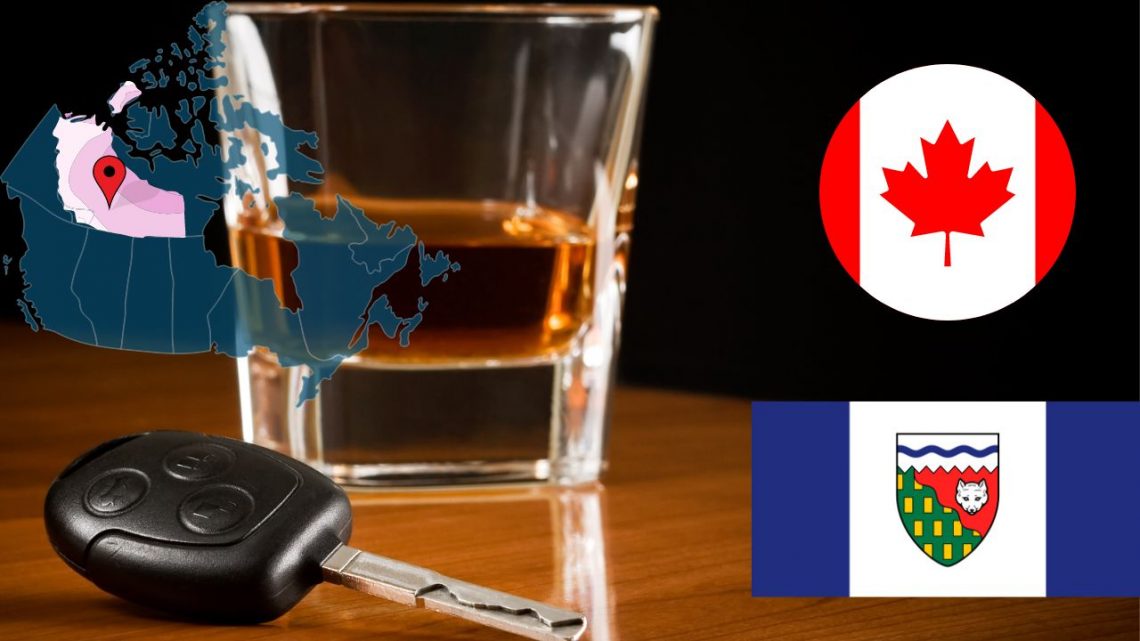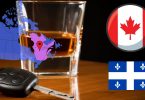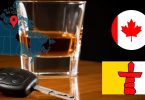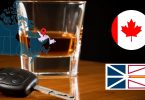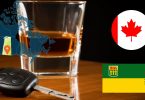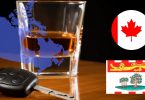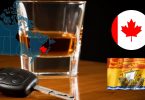In the Northwest Territories, the maximum allowable legal blood alcohol concentration (BAC) is set at 0.08%, which equates to 80 milligrams of alcohol per 100 milliliters of blood.
If you must travel after drinking, consider using a taxi or hiring a designated driver. We also urge that you regularly check Northwest Territories’ official website to stay up to date on the region’s impaired driving rules and regulations.
What is the legal alcohol limit for driving in Northwest Territories?
In the Northwest Territories, driving under the influence of alcohol is regulated by specific legal blood alcohol concentration (BAC) limits. These limits are designed to ensure the safety of all road users by setting clear guidelines for different categories of drivers. Below are the legal BAC limits based on driver’s category:
- Regular Drivers: The legal BAC limit is set at 0.08%. This means that drivers within this category are legally permitted to have up to 80 milligrams of alcohol per 100 milliliters of blood in their system while operating a vehicle.
- Commercial License Holders: For drivers holding a commercial license, the legal BAC limit is 0%. This strict zero-tolerance policy applies to ensure the highest level of safety given the nature of commercial driving responsibilities.
- Minors (Under 21) and Novice Drivers: It is illegal for drivers who are under the age of 21 or classified as novice drivers to operate a vehicle with any detectable amount of alcohol in their system. This policy enforces a 0% BAC limit to promote safe driving habits from the start.
Drink and Drive Penalties and Punishments in Northwest Territories
In the Northwest Territories, there is a stringent approach to dealing with impaired driving to ensure the safety of all road users. Penalties for driving under the influence of alcohol or drugs are enforced under both territorial and federal laws, emphasizing a zero-tolerance policy for certain categories of drivers. It’s important for drivers to regularly check the official state website for updates as laws and penalties may change. Below is an overview of the penalties and punishments related to impaired driving in the Northwest Territories:
Territorial Penalties (Under the Motor Vehicles Act)
- Zero Tolerance Policy: Applies to novice drivers, drivers under the age of 22, and drivers of specific commercial vehicles (tractors, combinations of tractors and trailers, straight trucks, taxis, vehicles with three or more axles, buses, school buses, emergency vehicles, and others prescribed under the Motor Vehicles Act) if any amount of drugs or alcohol is detected.
- Penalties for Novice Drivers and Under 22: A 30-day administrative licence suspension/disqualification.
- Commercial Vehicle Drivers: A 3-day administrative licence suspension/disqualification, unless they are a novice driver or under the age of 22, where a 30-day suspension applies.
- 24-hour Suspensions for Impaired Ability: Issued if an officer believes a driver’s ability is impaired by drugs, alcohol, or fatigue, or for drivers with a BAC exceeding .05%. This can escalate to 30 days for drivers with certain prior offences.
- 90-day Suspension for BAC Exceeding .08%: Administrative licence suspension/disqualification for drivers found to have a BAC above the legal limit.
- Failure or Refusal of Sobriety Tests: Administrative driver’s licence suspensions/disqualifications for failing, or refusing without a reasonable excuse, a Standardized Field Sobriety Test or an evaluation by a Drug Recognition Expert.
Federal Penalties (Under the Criminal Code)
- Impairment Offences: It’s a criminal offence to operate motor vehicles, vessels, aircraft, snowmobiles, or all-terrain vehicles while impaired by alcohol, drugs, or both.
- Over the Limit: Operating a vehicle over the prohibited blood drug concentration or blood alcohol concentration is also a criminal offence.
- Consequences: Penalties may include fines, driving prohibitions, and possible imprisonment.
For comprehensive and up-to-date information regarding impaired driving laws and penalties, including those imposed under the Criminal Code, please visit the Federal Department of Justice website. This resource provides detailed guidance on the legal ramifications of impaired driving and the efforts being made to combat this dangerous behavior on the roads of the Northwest Territories and across Canada.
How can I calculate if my alcohol blood limit is legal in Northwest Territories
In the Northwest Territories, the legal alcohol blood limit for driving is strictly enforced. Police utilize breathalyzers and blood tests to accurately determine a driver’s blood alcohol concentration (BAC). This measure is critical in identifying whether a driver is operating a vehicle within legal limits or is impaired.
To ensure you’re driving legally and safely, consider the following methods to check your BAC level:
1. Use a High-Quality Alcohol Breathalyzer
A reliable way to estimate your BAC is by using a high-quality alcohol breathalyzer. Based on my decade of experience as a phlebologist, I highly recommend the BACtrack S80. It’s notable for its professional-grade accuracy and is both DOT & NHTSA approved and FDA 510(k) cleared, making it a trustworthy device. Keeping a BACtrack S80 in your vehicle is a practical measure, especially given that individuals can easily misjudge their own level of impairment. This device can provide a clear indication of your BAC level, assisting in the decision not to drive if your BAC is close to or exceeds the 0.08% limit.
2. Utilize a BAC Calculator
Another resource at your disposal is a BAC calculator, which I developed in collaboration with fellow phlebologists and web developers. This tool is designed to give you an estimated BAC level based on the alcohol you’ve consumed, your weight, and the time span over which you’ve been drinking. While this method is less direct than using a breathalyzer, it can still offer valuable insights into your level of impairment.
It’s important to remember that both these methods provide estimates of your BAC and are not 100% accurate. Factors such as metabolism, food intake, and individual health conditions can affect your actual BAC. Therefore, these tools should be used as guidelines to assist in making safer driving decisions. If there’s any doubt about your sobriety or if you’re nearing the 0.08% limit, the safest choice is not to drive.
Ways to Avoid Driving with a High BAC in Northwest Territories
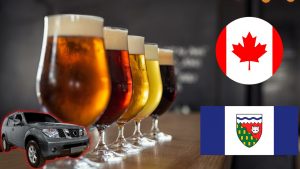
Driving with a high blood alcohol concentration (BAC) is not only illegal but also puts you and others at significant risk. Fortunately, there are convenient alternatives to driving under the influence in the Northwest Territories. Here are some effective strategies to ensure you get home safely without compromising your safety or breaking the law:
1. Utilize Ride-Sharing Apps or Local Taxi Services
One of the most straightforward ways to avoid driving after drinking is to use ride-sharing apps like Uber. If these services are available in your area, they offer a convenient and reliable option with just a few taps on your smartphone. Additionally, local taxi companies provide a valuable service for those without access to ride-sharing apps. In Yellowknife, for example, you can opt for Yellowknife Cab Ltd, while in Hay River, Reliable Cabs offers dependable transportation. These services are readily available and can take you to your destination safely, eliminating the risk of driving with a high BAC.
2. Order a Designated Driver Service
If you find yourself in a situation where you’ve driven to a location and consumed alcohol, leaving your car behind might not be your preferred option. In such cases, consider using a designated driver service. These services provide a driver who will drive you home in your own vehicle, ensuring both you and your car arrive safely. In Yellowknife, Yellowknife Designated Drivers is an excellent option. For those living in other parts of the Northwest Territories, a simple online search for “designated driver service” followed by your city’s name should provide relevant options.
These preventative measures are not only practical but also responsible choices that can significantly reduce the risks associated with impaired driving. By planning ahead and choosing alternatives to driving under the influence, you contribute to safer roads for everyone in the Northwest Territories. Always remember, the best plan is one that includes a safe return home without the need to operate a vehicle while impaired.
Sticking to Impaired Driving Laws in Northwest Territories: Sad Statistics
A survey in the Northwest Territories revealed that 18% of 313 drivers tested positive for drugs, alcohol, or both, leading to 264 alcohol and drug-impaired driving charges in 2019. In response, the NWT government has strengthened impaired driving laws to reduce such incidents. While consuming alcohol and driving is permissible within the legal BAC limits, impairment by any substance puts you at risk of legal consequences.
Drunk driving poses a significant risk to both the driver and other road users. Alternatives such as asking a friend to drive, using a taxi, or ride-hailing services are recommended for those who have consumed alcohol. It’s crucial to ensure your BAC is below the legal threshold if you must drive.
Understanding and adhering to the Northwest Territories’ impaired driving laws is essential for road safety. For the most current information, it’s advisable to consult the official website. Remember, even a small amount of alcohol can affect driving ability differently among individuals, making it safer to avoid driving after drinking altogether.

